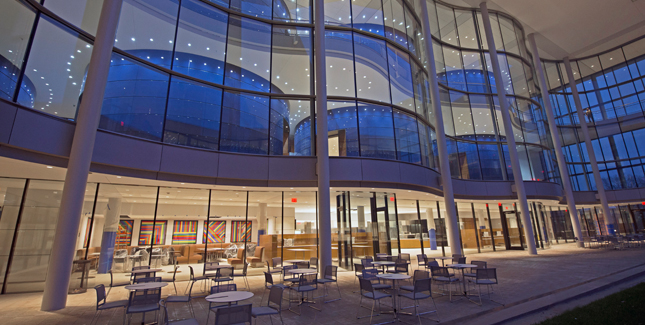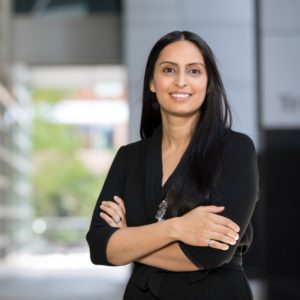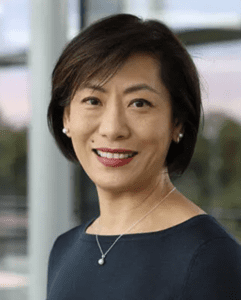
Yale School of Management in New Haven, Conn.
As the third oldest university in the United States, Yale University has a slew of experiences and traditions that are uniquely Yale: From its Residential Colleges that are often compared to Hogwarts houses, to the 54 bells of the Memorial Carillon, to Handsome Dan, its beloved bulldog mascot. Since a Yale student bought the first Handsome Dan in 1889, 18 more bulldogs have held the name.
For Fareen Sunderji, EMBA ‘22, her bespoke Yale Experience came watching The Game: The annual football battle between the bulldogs and their Ivy League rivals, the Harvard Crimson. “I’ll never forget the energy of the fans at Yale Bowl and the pride of being part of a deeply rooted tradition,” she tells Poets&Quants.
Executives in Yale School of Management’s EMBA program come from all over the United States and Latin America. While 59% of the Class of 2025 hailed from the Northeast, 41% fly-in every other weekend. Program leaders work hard to give each one a unique Yale Experience to connect them to the storied campus.
YALE SOM’S EMBA GETS AN UPDATE
Compared to its long history, Yale’s EMBA program isn’t all that old. Yale SOM launched its MBA for executives in 2005 with a focus on healthcare. It expanded its focus areas to asset management and sustainability in 2014.
Beginning for the class entering in 2024, it will add a fourth focus area in general management. Students will also be able to choose electives and attend academic conferences and seminars outside of their own focus areas, a change from previous classes.

Fareen Sunderji, EMBA ’22
“This evolution in the MBA for Executives program will continue to build on what is special and unique in the program while enabling us to reach more people who will benefit from exposure to Yale’s mission-driven model of leadership and from deeper understanding of major issues confronting business and society,” says Wendy Tsung, the assistant dean of the EMBA program.
AN ENERGY EXEC WITH AN EYE ON SUSTAINABILITY
Sunderji, of Calgary, Canada, has worked in the energy sector for more than 15 years. She’s worked in a wide range of functions from engineering to operations, from supply chain to asset acquisition, from divestment to integration.
“It is a pivotal time in this sector where the industry has been facing both challenges and opportunities as it relates to energy transition and strategies for a future state,” says Sunderji. She chose Yale’s EMBA, in part, because of its sustainability focus.
“With Yale’s global brand recognition, faculty with some of the world’s highest accolades, in addition to SOM’s emphasis to integrate business and society, I knew this was the right fit for me,” she says. “The objective wasn’t to obtain a certification from any University, the focus was to be challenged and have an enriching experience.”
She also wanted the immersive in-person experience. She discovered that, like herself, her classmates are frequently asked to evaluate complex, ambiguous situations in their jobs. “It was highly beneficial to leverage expertise or leadership experiences from various industries to learn about application, practice and in some cases, risk mitigations,” she says.
Since graduating from the program, Sunderji has been able to advance in the energy transition sector. She will join Kiwetinohk Energy as president of the company’s power division.
YALE SOM EMBA SPOTLIGHT
Yale’s MBA for Executives ranked 5th in Poets&Quants For Execs’ 2022 composite EMBA ranking of U.S. programs, up 13 spots from the year before due to its strong showing in the three rankings we used for the composite: U.S. News & World Report, Financial Times, and The Economist.
| Yale School of Management MBA For Executives At A Glance | |||
| Length | 22 months | ||
| Format | In person with classes every other weekend, Fridays and Saturdays | ||
| Cohort Size | 60 to 70 | ||
| Residencies | Four residency weeks, including a Global Network Week at one of Yale’s international school partners | ||
| Academics | Students take SOM’s integrated core curriculum in the first year, then choose one of four focus areas: asset management, healthcare, sustainability, or general management | ||
| GMAT, GRE, or EA | Required | ||
| Cost | $208,500 | ||
This week, we’re delving deeper into the updates to the program, which will rollout for the Class of 2026, as part of our EMBA Spotlight series. We spoke with EMBA assistant dean Wendy Tsung, who took on her role in 2019, just before the pandemic.
Our conversation, presented below, has been edited for length and clarity.
Let’s start with a brief history of the Yale EMBA.
The MBA for Executives program started in 2005 as a healthcare focused MBA program, and we continued in that model until 2014, when we expanded focus areas to asset management and sustainability. All three of those areas were defined because they were very mission based.
Our mission at the Yale School of Management is educating leaders for business and society. We believe in solving these big issues for society, and all three of these areas are really at the nexus of business and society. That’s why we identified these three areas as well as looking at the expertise within our faculty.

Wendy Tsung, assistant dean of the EMBA at Yale SOM
So we graduated our first class in 2016 with those three areas. Most recently, we just decided that we needed to look at a broader set of leaders to educate, because business issues are much more complex and no longer sort of industry specific.
When you added those two focus areas in 2014, did it expand your cohort size?
Yes, it did, quite dramatically I think. When we were a healthcare program, our class size was really around 20 to 25 students a year. When we grew to our three areas of focus, our class size averaged 60 to 70 students a year.
Do you expect adding the general management option to increase class size as well?
Our goal really wasn’t to increase our cohort size, our goal was really to look at who we’re educating, what’s happening in society and in business, and to see how we can best make an impact in that area.
Tell us a little bit more about adding the new general management focus.
First of all, our curriculum, especially in our three areas, draws on faculty not only within the School of Management, but across Yale. So we have faculty from the law school, from the School of the Environment, from the medical school, from public health, all teaching in our program because they’re experts in their area which is aligned with our areas of focus.
We began to hear from them, as well as from our students and from our alums, about how their interests, desires, and their work intersects with our other areas of focus. And so, as we started to have those conversations, we tried to come up with the best way to create that level of flexibility for our students and to create the access to that knowledge for them without taking a 180 from our mission based program.
Can you give us an overview of the format of the Yale EMBA?
Our program is 22 months in length, and our students meet every other weekend. They also have four residency weeks: two at the start of the program, one at the start of their second year, and one global network week where they go to one of our international school partners and can take a course in a number of topics. They choose where they would like to go for that one week.
Our students come from across the U.S., North America, Latin America, and they’re very committed to being in New Haven for the program.
Have you talked about any kind of online or virtual options for the travelers, especially after the pandemic?
That’s always a conversation point for us, especially with what we’re seeing more of in the marketplace. But we truly find that having this in-person experience is just irreplaceable. The organic conversations, the depth of that sort of engagement, the opportunity to really get to know our faculty, the cohort and the rest of the campus is just not possible in an online or hybrid type of an environment.
Having said that, we know our students, these busy working professionals, have difficult and challenging schedules. So even before the pandemic, we offered what was what’s called our extended classroom. A number of students can participate online, in real time, in our class weekends. Our EMBA classrooms were built out specifically for this pre-pandemic. So we’ve always had the capability to engage our students who could not be physically on campus for for whatever reason.
Do you see maybe more interest in that post pandemic?
I think people’s lives have changed, and travel has changed. We definitely saw an increased level of need for the extended classroom, although that is tapering down some now as things get back to normal. I think our students really do want to be in person as much as possible because there’s just so much value that comes out of that.
I think our cohort size is probably a little smaller than our peer schools, and that really allows them to get to know each other really well. We’ve had so many interesting relief efforts come out of each of our cohorts, or interesting new ventures, or writing cases with our faculty members, just like really interesting work that have come out of our student and faculty engagement.

Yale School of Management Yale School of Management is adding a fourth focus area in general management to its MBA for Executives for the Class of 2026.
What is special about Yale’s EMBA curriculum?
Our EMBA curriculum is exactly the same as our MBA curriculum.The first year is filled with our integrated core which is, I think, very unique to Yale. The Integrated Core started many years ago with the belief that business problems are not siloed in business function. They’re big and messy problems, and you need to have all of these different business functions in play as you’re trying to solve a complex problem.
So we created the Integrated Core from a stakeholders perspective. Our classes are called, like, customer, and investor, and innovator, and the workforce, and we’re looking at problems from those lenses which brings in all of the different elements of a business education. I think our faculty do the hard work of trying to bring in all of these pieces into their courses.
So, that’s the first year, and it’s all it’s lockstep in that respect
The second year for our EMBA students, students then go into our area focus classes. So if they were in asset management, they will take a set of asset management courses. If they’re in healthcare, they take a set of healthcare courses, etc. As well as a few electives that they would take, and then what we call our advanced management courses. So these are courses that we feel are really important to the additional learning that they would need to have as leaders.
Starting for the Class of 2026, EMBA students will be allowed to take electives outside of their focus area, correct?
Yes, starting with the class that we’re recruiting now, instead of stating in their application which area of focus they want to align with, they will have the opportunity to come in, really experience the core and and then make a determination as to whether or not they want to align with an area of focus or to sample different courses, as they feel would most benefit would be most beneficial for them.
What was the reasoning behind this change?
A lot of that was conversations, like I said earlier, with our students and faculty. They were saying, “I’m taking this climate change class and sustainability, but I really need the investment knowledge so that I can bring that back to my company as we’re dealing with these climate change issues.” Or, “I’m currently in healthcare, but I really need to understand how sustainability is affecting our healthcare industry, and how that would impact our financial decisions.”
It’s sort of bringing together all of these different pieces, and having access to those types of courses and content will really benefit what they can bring back to their organizations.
| Yale EMBA Class of 2025 Profile | |||
| Women | 44% | International | 3% |
| Average Years Work Experience | 14 | Northeast | 59% |
| Average Age | 36 | Southeast | 20% |
| U.S. Underrepresented minorities | 34% | West | 10% |
| Advanced degree holders | 46% | Southwest | 5% |
| Military | 10% | Midwest | 3% |
What kind of student are you targeting in our EMBA program?
We’ve always looked for students who want to make a real difference in business and in society, who really want to solve those complex issues, and want to work within their organizations to do so. But we are definitely expanding the professional diversity of our students with this change. Whereas before, we were really focused on students who already had asset management, health care and sustainability backgrounds. Now we’re opening that up.
Are you exploring any other opportunities or innovations in the EMBA market?
I think we’re always thinking about and looking at what’s happening in the marketplace, but we also want to make sure that it makes sense for who we are and that we stay true to our mission.
I think there’s been a lot of movement in our space, and also a lot of fragmentation, whether it be in more specialization or in modalities and things like that. And that’s all great. But we always have to say, does that make sense for us? Is that who we are?
DON’T MISS THESE STORIES IN OUR EMBA SPOTLIGHT SERIES:
- CAMBRIDGE JUDGE OFFERS MORE FLEXIBILITY WITH ITS NEW GLOBAL EMBA
- AFTER PANDEMIC PAUSE, WISCONSIN SCHOOL OF BUSINESS LAUNCHES NEW HYBRID EXECUTIVE MBA
- ASU CAREY’S EMBA OFFERS A LEADING CONCENTRATION IN THE BUSINESS OF HEALTH CARE
- TEXAS A&M UNIVERSITY’S MAYS BUSINESS SCHOOL EXECUTIVE MBA
- SCU LEAVEY’S EXECUTIVE MBA IN THE HEART OF SILICON VALLEY
- THE UNIVERSITY OF TEXAS AT AUSTIN MCCOMBS EXECUTIVE MBA
- UW FOSTER’S PROGRAM BRINGS STUDENTS TO SEATTLE’S TECH MECCA
- EMORY GOIZUETA’S PURSUIT OF FLEXIBILITY
- TCU NEELEY’S PROMISE: ‘ROI STARTS MONDAY’
- AT UMN CARLSON, A NEW CURRICULUM & HYBRID OPTION
- HOW CORNELL JOHNSON’S PROGRAM IS UNIQUELY SUITED TO THE MOMENT
- THE BENEFITS OF RUTGERS’ ACADEMIC-RUN EMBA POWERHOUSE





Questions about this article? Email us or leave a comment below.